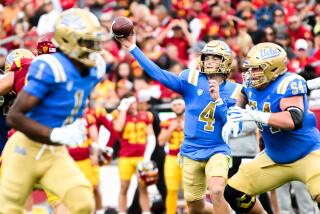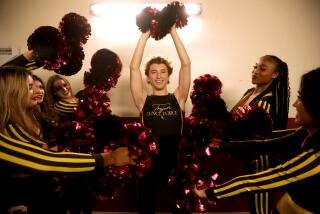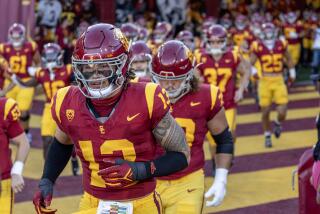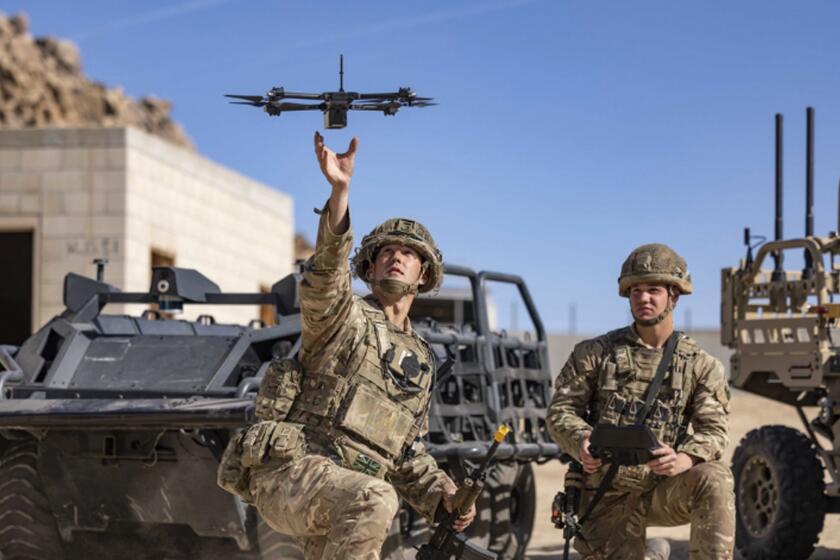USC has a new varsity team: The Trojans of esports
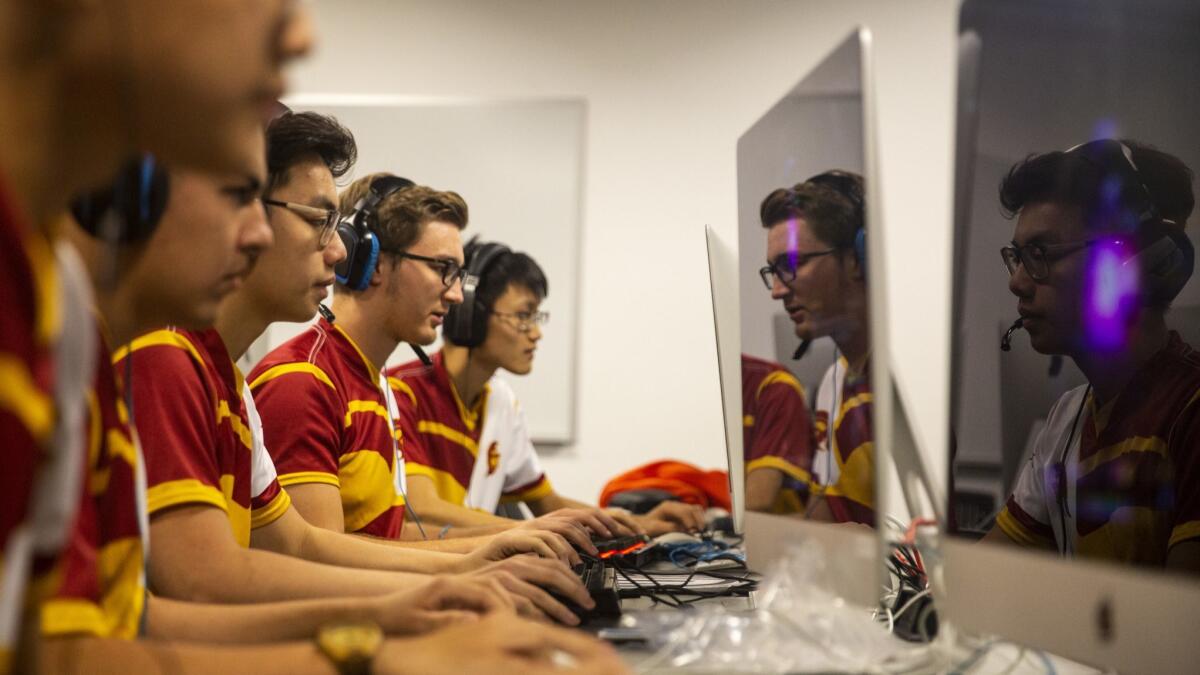
The players on USC’s newest varsity team wear the familiar cardinal and gold, with Tommy Trojan splashed across the front of their jerseys. But on their backs, fans will find names that have never graced a playing field: TankNStein, Kamdono, Loopy, bestty, and Study Meta.
As they scrimmaged in a windowless campus basement Monday night, eyes glued to the popular online battle game League of Legends, the team’s student analyst, Michael Ahn, took note of how players could improve their form. Coach Peter Zhang, recruited from the pro leagues, tracked from his own screen how well the squad followed his strategies.
They were prepping for their game on Thursday night, when the team will battle UCLA in an exhibition match at USC’s Conquest pep rally. The teams will face off onstage in front of an array of gaming computers. Spectators will be able to follow the action on giant screens displaying the players’ monitors.
The varsity League of Legends team is the most public face of a larger organization launching Thursday, the school’s new Esports Union, or ESU.
Unlike most college esports leagues, which are overseen by athletic or campus life departments, USC’s initiative is an offshoot of its game design program, which draws on resources from the film and engineering schools.
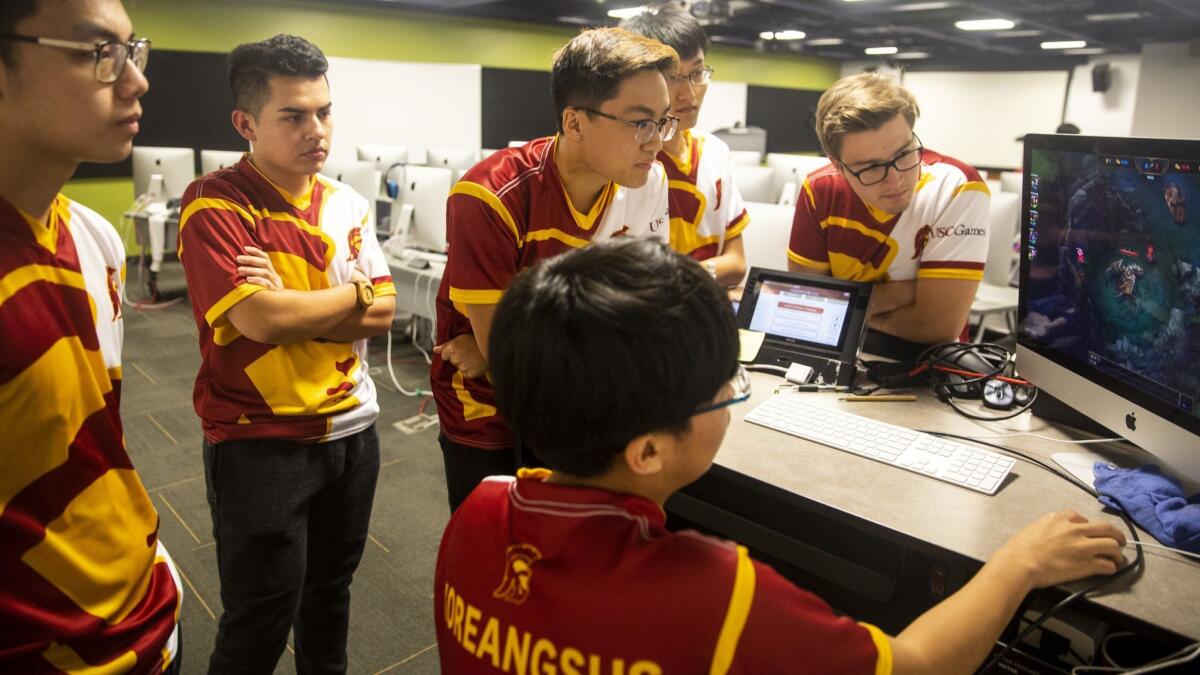
Along with of the official team, the ESU will support student clubs across a number of games, and run programs such as League of Legends clinics, where more casual players can pick up pro-level pointers from the varsity squad.
In coming years, the ESU will also support classes dedicated to the event-management and business side of esports, add more varsity teams in popular games such as the team shooter Overwatch and Nintendo’s brawler Super Smash Bros., and help set up scholarship programs for e-athletes.
The creation of the program was spearheaded by current USC senior Keanu Concepcion, who pitched the idea in the fall of 2017 as a way for the school — which is already home to a top-ranked game design program — to remain competitive in all aspects of the growing field.
“My argument for the administration was: If we start the process to make a varsity esports program now, by the time it matters in terms of rankings, USC will be excellently positioned to maintain our top spot,” Concepcion said.
“We always have to be where the industry is and where the art form is,” said Danny Bilson, chairman of the Interactive Media & Games Division of USC’s film school. “It was already on our radar, but once the enthusiasm of the students became clear, we started talking about how we start from zero as USC — one of the better game design schools around, with a well-renowned athletic department.”
With students taking the lead on running the Esports Union and faculty advisors clocking long hours to get the program off the ground, the program is running lean to start, but corporate sponsors such as Red Bull and Logitech are helping fund the initial push.
“We have to bootstrap everything; we’re a school,” Bilson said. “We’re not saying, ‘Let’s throw off a bunch of budget,’ like we’re a game company,’ it’s all homegrown.”
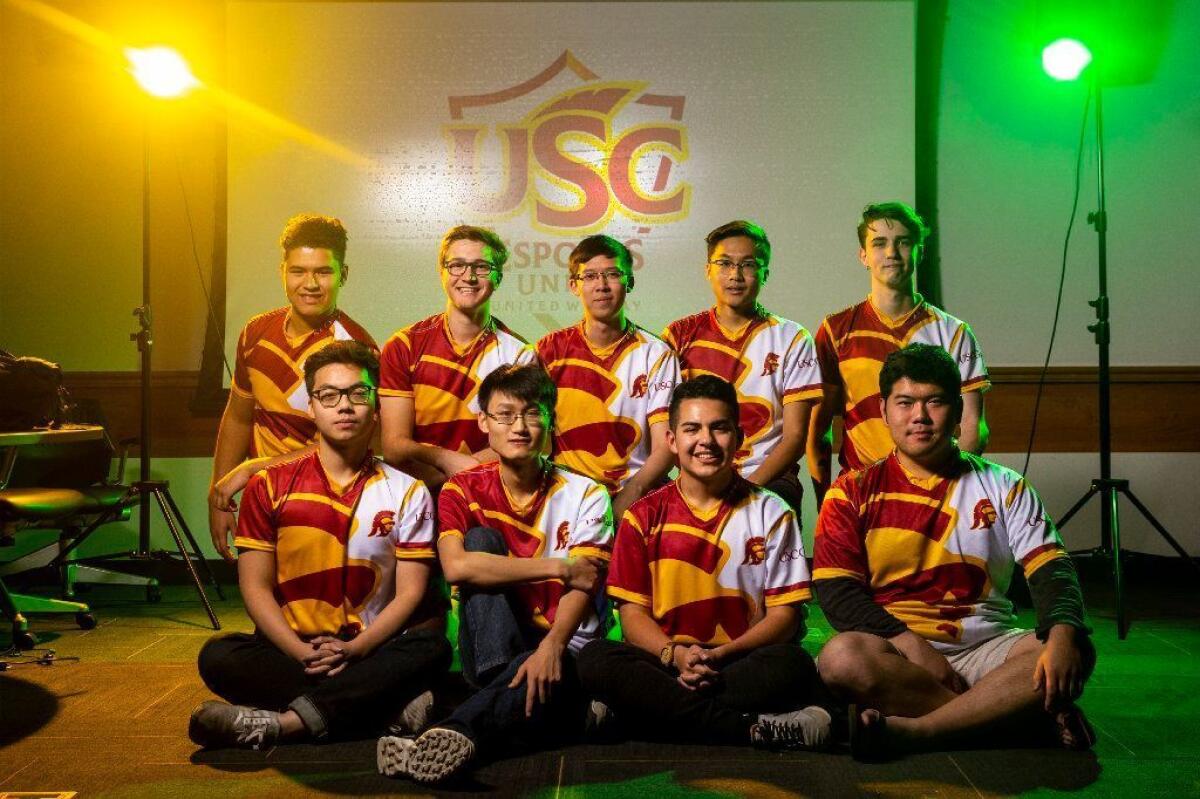
In spring, posters across campus announced open tryouts and the team began taking shape. The program settled on League of Legends as its first focus, both because the game has a well-developed collegiate league with more than 80 schools split among regional divisions and because its founders, Brandon Beck and Marc Merrill, are both USC alumni.
USC also looked to nearby schools for models. UC Irvine has the best-developed esports program in the region, with a campus esports arena and about $80,000 in scholarships for students who make the cut for competitive League of Legends and Overwatch teams.
Zhang, the USC coach, has worked with UC Irvine in the past, and has also served as the head coach for the L.A.-based professional squad Team Liquid.
Michael Sherman, head of Riot Games’ college esports in North America, said school teams help teach players the responsibility and social skills needed to compete at the highest levels of the sport.
“The average pro player is 21.5 years old — trending older as opposed to younger,” Sherman said. “That’s because we’re looking for a lot more of the soft skills. The path of a 17-year-old moving out of his parents’ house and into a team environment with no experience completely on their own was not creating the best team players.”
It’s a boom time for college esports, with Sherman saying that Riot’s program has more than doubled year over year since starting in 2014. It follows the success of the esports industry itself, which has seen dedicated arenas opening up across the country, prize money for major competitions in the tens of millions of dollars, and a global revenue estimated to hit $1.4 billion by 2020, according to market research company Newzoo.
With esports currently falling outside of the NCAA’s jurisdiction, student competitors are allowed to take home cash prizes.
But Neal Robison, an analyst with Moor Insights & Strategy who researches esports, said cash is beside the point for most collegiate esports programs.
“It’s more about recruitment,” Robison said. “Especially for the smaller schools, this is a way of attracting computer science talent to their university, and specifically attracting female STEM students.”
USC’s varsity program is coed, though its inaugural team has only one female player out of 16.
Concepcion, who has become the program’s director for his final year at USC, said it also serves as another connection to the growing industry.
“Varsity esports is a pathway to build a community on campus, but I think most importantly it’s a pathway to working in the space,” Concepcion said.
And on Thursday night, he’ll be cheering for the team along with the rest of the crowd. Despite running the program, he isn’t on the team. He said getting the ESU off the ground is plenty of work on its own.
Plus, he didn’t make the cut. “I am nowhere near the level of our frontline team,” Concepcion said. “They’re on a whole other level.”
Follow me on Twitter: @samaugustdean
